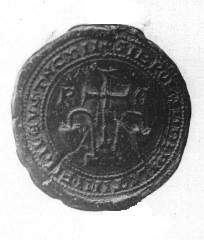Related Research Articles
Julius (I) from the kindred Kán was a powerful Hungarian baron and landowner, who held several secular positions during the reign of kings Emeric, Ladislaus III and Andrew II. He was the ancestor of the gens Kán which originated from Baranya County.
Apor from the kindred Péc was a Hungarian baron and landowner at the turn of the 13th and 14th centuries, who held several secular positions during the reign of kings Ladislaus IV and Andrew III. He was one of the seven barons in the early 14th century, who were styled themselves Palatine of Hungary.
Mog, also Moch or Mok was a powerful Hungarian lord in the Kingdom of Hungary at the turn of the 12th and 13th centuries, who served as Palatine of Hungary three times.
Mika (I) from the kindred Ják was a Hungarian influential lord in the Kingdom of Hungary at the turn of the 12th and 13th centuries.
Nicholas was an influential Hungarian lord in the Kingdom of Hungary, who served as Palatine of Hungary twice during the reign of Andrew II of Hungary.
Pousa from the kindred Bár-Kalán was a Hungarian noble, who served as Judge royal for a short time in 1222, during the reign of Andrew II of Hungary.

Demetrius I from the kindred Csák was a Hungarian baron, who held secular positions during the reign of kings Andrew II and Béla IV.
Monoszló was the name of a Slavonian-origin gens in the Kingdom of Hungary. Several prominent secular dignitaries came from this kindred.
Macarius (I) from the kindred Monoszló was a Hungarian noble, the first known member of the gens Monoszló.
The judge of the Cumans was a short-lived legal office, then an ex officio title in the Hungarian royal court, existed since the second half of the 13th century. In 1270, the Palatine of Hungary assumed the dignity and became part of its title to merge the two positions for centuries, during which time Cuman settlers were concentrated into Kunság region.

Arnold (II) from the kindred Hahót was a Hungarian baron, who served as Palatine of Hungary for a short time in 1242.
Pat (I) from the kindred Győr was a Hungarian influential lord at the turn of the 12th and 13th centuries, who served as Palatine of Hungary from 1209 until 1212.
Reynold (II) from the kindred Básztély was a Hungarian baron, soldier and courtier, who was a staunch supporter of Duke Stephen. Originating from a royal servant family, he elevated into the nobility due to his military successes and loyalty. At the peak of his career, he served as Palatine of Hungary in 1289. He was the ancestor of the powerful Rozgonyi family.
Denis from the kindred Péc was a Hungarian powerful baron and soldier in the 13th century. Initially, he was a confidant of rex iunior Stephen, but later joined the partisans of the elderly Béla IV of Hungary. He actively participated in the military campaigns against Austria and Bohemia. He served as Palatine of Hungary and other high-ranking positions several times during the era of feudal anarchy.

Roland (II) from the kindred Rátót was a Hungarian baron at the turn of the 13th and 14th centuries. He was one of the seven barons in the early 14th century, who were styled themselves Palatine of Hungary. He was the ancestor of the Jolsvai family.
Mojs, also Moys, Majs or Majos was a Hungarian powerful baron in the 13th century, who held various positions in the royal court since the early 1250s. He retained his influence until his death, owing to his marriage with an unidentified relative of the ruling Árpád dynasty. His last will and testament is a uniquely detailed source on the social history of the Árpádian era. Through his daughters, Mojs was maternal ancestor of the Meggyesi, Tamási, Herceg de Szekcső and Báthory de Somlyó noble families.
Michael, son of Ampud was a baron in the Kingdom of Hungary in the first decades of the 13th century, who served as Ban of Slavonia in 1224.
Maurice (I) from the kindred Pok was a Hungarian noble in the first half of the 13th century, who had ascended to the upper elite from a lower social status as the faithful confidant of Andrew II of Hungary. He was the forefather of the prestigious Meggyesi family.
Stephen from the kindred Csák was a Hungarian baron and military leader in the 13th century. He was a confidant of King Béla IV of Hungary since his heir years to the throne. He led the Hungarian army to victory against the Serbs, who invaded the Duchy of Macsó in 1268.
Nicholas from the kindred Szák was a Hungarian powerful baron in the first decades of the 13th century. As a confidant of King Andrew II, he served as Palatine of Hungary from 1219 to 1222 and for a brief time in 1226. During his first term, he initiated a comprehensive reform of the judicial system.
References
- 1 2 Zsoldos 2011, p. 223.
- ↑ Engel: Genealógia (Mojs kinship 1.)
- 1 2 Markó 2006, p. 239.
- 1 2 Zsoldos 2020, pp. 85–86.
- 1 2 Zsoldos 2011, p. 18.
- ↑ Zsoldos 2011, p. 139.
- ↑ Szőcs 2014, p. 65.
- ↑ Zsoldos 2011, p. 30.